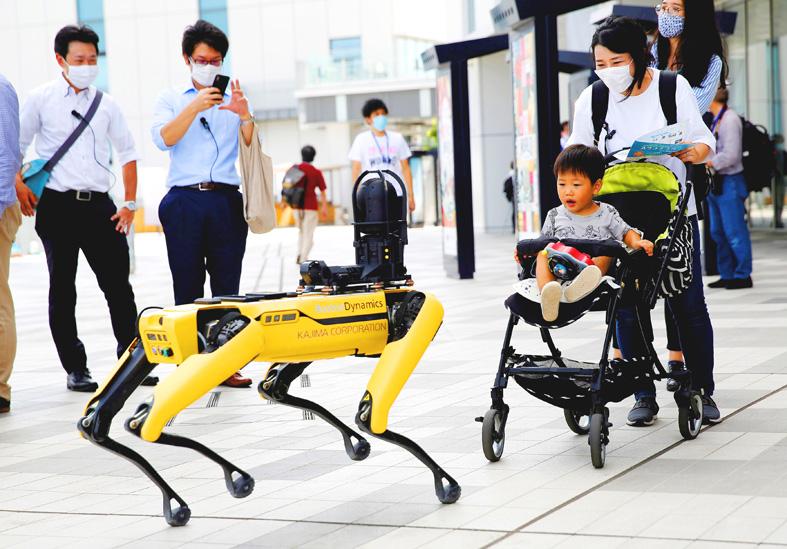Hyundai Motor Group agreed to buy a controlling stake in Boston Dynamics Inc in a deal that values the mobile robot firm at US$1.1 billion.
Hyundai Motor Group, along with some associated companies and chairman Euisun Chung, is to acquire an 80 percent interest in the US robotics company from Softbank Group Corp, leaving the Japanese firm with a 20 percent share, the companies said in a statement on Friday.
South Korean conglomerate Hyundai Motor Group has been beefing up its research in robotics as it expands further into electric and autonomous vehicles.

Photo: Reuters
Carmaker Hyundai Motor Co plans to spend more than 60 trillion won (US$55 billion) in the next five years in these areas to become one of the world’s leading auto manufacturers.
The broader empire is also exploring practical uses for industrial robots.
Other Hyundai entities that would participate include auto-parts maker Hyundai Mobis Co and Hyundai Glovis Co, which provides international and domestic logistics services.
A sale of Boston Dynamics would mark another twist in the trajectory of a company that spun out of the Massachusetts Institute of Technology in the early 1990s and operated independently until Google bought it in 2013. It was sold again in 2017, that time to Softbank.
At times, Boston Dynamics has functioned more like a research organization than a business, churning out machines that are technologically advanced and whimsical, but unprofitable. That includes Spot, a maneuverable dog-like robot.
Videos of its creations regularly rack up millions of views on YouTube, but the company has said it is not currently generating a profit.
Within Softbank, Boston Dynamics formed part of a disparate collection of robotics ventures in the technology firm’s portfolio, including developers of robots for warehouses, restaurants and other industrial applications.
Its staff tripled to 300 people and it moved into new headquarters in a refurbished former postal building in Waltham, Massachusetts, at a cost of US$20 million, a person familiar with the matter said earlier this year.
Late last year, Softbank made a new push to steer the robot maker toward profitability, accelerating an effort that had started under Google.
Hyundai by contrast makes highly practical industrial robots intended for factory use. The group has been developing robotics such as exoskeleton suits that help ease fatigue and prevent injury for factory workers.
It is also working on robots with artificial intelligence that can provide assistance at hotels and in other service sectors.
Chung, who became the group’s chairman in October, has been transforming the conglomerate to introduce more electric vehicle lineups and plans to enter the aerial vehicle market in 2028.
The group is also building an innovation center in Singapore where Hyundai would work on developing artificial intelligence, big data and other technologies to enhance its manufacturing processes, fine tuning the “brains” behind the smarter and more environmentally friendly cars of tomorrow.

Intel Corp chief executive officer Lip-Bu Tan (陳立武) is expected to meet with Taiwanese suppliers next month in conjunction with the opening of the Computex Taipei trade show, supply chain sources said on Monday. The visit, the first for Tan to Taiwan since assuming his new post last month, would be aimed at enhancing Intel’s ties with suppliers in Taiwan as he attempts to help turn around the struggling US chipmaker, the sources said. Tan is to hold a banquet to celebrate Intel’s 40-year presence in Taiwan before Computex opens on May 20 and invite dozens of Taiwanese suppliers to exchange views

Application-specific integrated circuit designer Faraday Technology Corp (智原) yesterday said that although revenue this quarter would decline 30 percent from last quarter, it retained its full-year forecast of revenue growth of 100 percent. The company attributed the quarterly drop to a slowdown in customers’ production of chips using Faraday’s advanced packaging technology. The company is still confident about its revenue growth this year, given its strong “design-win” — or the projects it won to help customers design their chips, Faraday president Steve Wang (王國雍) told an online earnings conference. “The design-win this year is better than we expected. We believe we will win

Chizuko Kimura has become the first female sushi chef in the world to win a Michelin star, fulfilling a promise she made to her dying husband to continue his legacy. The 54-year-old Japanese chef regained the Michelin star her late husband, Shunei Kimura, won three years ago for their Sushi Shunei restaurant in Paris. For Shunei Kimura, the star was a dream come true. However, the joy was short-lived. He died from cancer just three months later in June 2022. He was 65. The following year, the restaurant in the heart of Montmartre lost its star rating. Chizuko Kimura insisted that the new star is still down

While China’s leaders use their economic and political might to fight US President Donald Trump’s trade war “to the end,” its army of social media soldiers are embarking on a more humorous campaign online. Trump’s tariff blitz has seen Washington and Beijing impose eye-watering duties on imports from the other, fanning a standoff between the economic superpowers that has sparked global recession fears and sent markets into a tailspin. Trump says his policy is a response to years of being “ripped off” by other countries and aims to bring manufacturing to the US, forcing companies to employ US workers. However, China’s online warriors